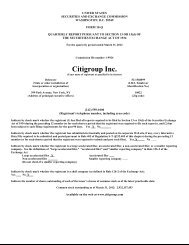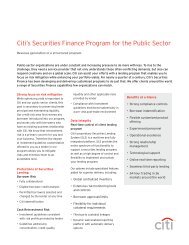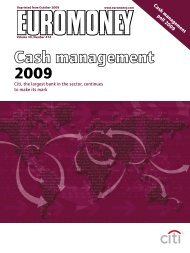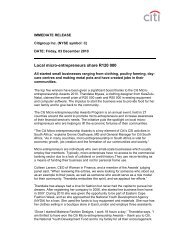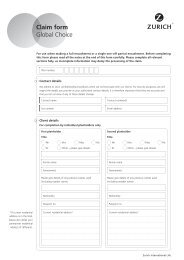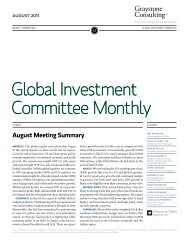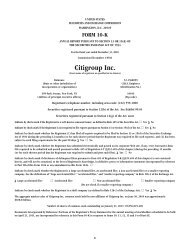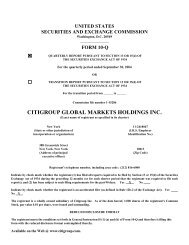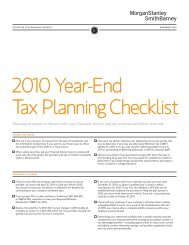FRANkLiN TEMPLETON INVESTMENT FUNDS - Citibank
FRANkLiN TEMPLETON INVESTMENT FUNDS - Citibank
FRANkLiN TEMPLETON INVESTMENT FUNDS - Citibank
You also want an ePaper? Increase the reach of your titles
YUMPU automatically turns print PDFs into web optimized ePapers that Google loves.
PROSPECTUS OF FRANKLIN <strong>TEMPLETON</strong> <strong>INVESTMENT</strong> <strong>FUNDS</strong><br />
Most credit- linked securities are structured as U.S. Rule 144A securities so that they may be freely traded<br />
among institutional buyers. A Fund will generally only purchase credit- linked securities, which are<br />
determined to be liquid in accordance with the Fund’s liquidity guidelines. However, the market for<br />
credit- linked securities may suddenly become illiquid. The other parties to the transaction may be the<br />
only investors with sufficient understanding of the derivative to be interested in bidding for it. Changes in<br />
liquidity may result in significant, rapid and unpredictable changes in the prices for credit- linked securities.<br />
In certain cases, a market price for a credit- linked security may not be available or may not be reliable,<br />
and the Fund could experience difficulty in selling such security at a price the Investment Manager<br />
believes is fair.<br />
The value of a credit- linked security will typically increase or decrease with any change in value of the<br />
underlying debt obligations, if any, held by the issuer and the credit default swap. Further, in cases where<br />
the credit- linked security is structured such that the payments to the Fund are based on amounts received<br />
in respect of, or the value of performance of, any underlying debt obligations specified in the terms of the<br />
relevant credit default swap, fluctuations in the value of such obligation may affect the value of the creditlinked<br />
security.<br />
Defaulted Debt Securities Risk<br />
Some Funds may invest in debt securities on which the issuer is not currently making interest payments<br />
(defaulted debt securities). These Funds may buy defaulted debt securities if, in the opinion of the Investment<br />
Manager, it appears likely that the issuer may resume interest payments or other advantageous developments<br />
appear likely in the near future. These securities may become illiquid.<br />
The risk of loss due to default may also be considerably greater with lower- quality securities because they<br />
are generally unsecured and are often subordinated to other creditors of the issuer. If the issuer of a security<br />
in a Fund’s portfolio defaults, the Fund may have unrealised losses on the security, which may lower the<br />
Fund’s net asset value per Share. Defaulted securities tend to lose much of their value before they default.<br />
Thus, the Fund’s net asset value per Share may be adversely affected before an issuer defaults. In addition,<br />
the Fund may incur additional expenses if it must try to recover principal or interest payments on a<br />
defaulted security.<br />
Included among the issuers of debt securities or obligations in which the Company may invest are entities<br />
organised and operated solely for the purpose of restructuring the investment characteristics of various<br />
securities or obligations. These entities may be organised by investment banking firms, which receive fees<br />
in connection with establishing each entity and arranging for the placement of its securities.<br />
Derivative Risk<br />
For the purpose of efficient portfolio management, the Company may, within the context of each Fund’s<br />
overall investment policy, and within the limits set forth in the investment restrictions applicable to the<br />
Funds, engage in certain transactions involving the use of derivative instruments, including; (i) put and<br />
call options on securities, debt obligations, indices and currencies (including over- the-counter options);<br />
(ii) stock index and interest rate futures contracts and options thereon; (iii) structured products, where<br />
the security is linked to or derives its value from another security; and (iv) delayed delivery or when- andif<br />
issued securities such as may be created as a result of a debt restructuring. The Company may engage,<br />
within the limits established by the investment restrictions, in various portfolio strategies involving the<br />
use of hedging instruments in order to hedge against market and currency risks. If a Fund intends to engage<br />
in transactions involving the use of derivative instruments as part of its investment strategy, rather than<br />
on an occasional basis, this will be described in the investment objective of such Fund.<br />
The use of derivative instruments and hedging transactions may or may not achieve its intended objective<br />
and involves special risks.<br />
Some Funds may also invest in financial derivative instruments as part of their portfolio as disclosed in<br />
their investment objectives.<br />
www.franklintempleton.lu 35



